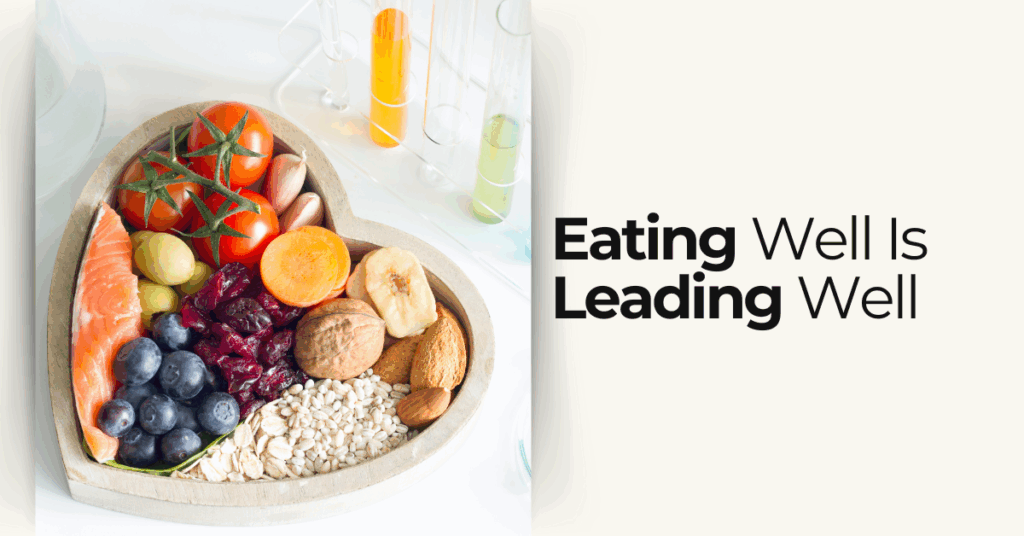
Eating Well is Leading Well
Chew on This
Ever wonder what would happen if you swore off ultra-processed foods for a month?
Check this out.
In an article featured in the Wall Street Journal, a family in Alpine, TX, decided to take on this bold challenge.
Together, they would abstain from ultra-processed foods for 30 days.
As a frame of reference, ultra-processed foods are those items that contain refined flour, artificial flavors, and hard-to-pronounce things like maltodextrin, soy lecithin, and guar gum.
To put this in layman’s terms, this family put the kibosh on things like chips, crackers, soda, cereal, and yes, even Pop-Tarts.
For 30 days.
Here’s What Happened
About 10 days in, the family “started to notice a striking shift”: They weren’t constantly thinking about food.
This is an important revelation.
In fact, in a day and age when researchers estimate that the typical person will be exposed to 4,000 – 10,000 food ads daily, not to be thinking about food is a big deal indeed.
Said differently, when you stop eating ultra-processed foods, your cravings fade.
And research backs this up.
Interestingly, a randomized, controlled eight-week trial involving 50 adults, published this month in Nature Medicine, found that participants who switched to a minimally processed diet not only lost weight but also saw their food cravings decline.
Simply amazing.
But there’s more.
In addition to not craving junk food throughout the day, family members also found that their preferences actually shifted away from the ultra-processed foods toward healthier whole foods.
By way of explanation, whole foods are those foods that don’t contain anything other than what they are (e.g., raw fruits and vegetables contain no additives; nor does salmon, chicken, or beef, etc. However, a snack cake might contain 25 or more ingredients).
Imagine, just by cutting out junk foods, your cravings can fade, and your appetite for whole, nutritious foods can increase.
Pretty encouraging, huh?
But we’re not done.
Food for Thought
In addition to the aforementioned benefits, another remarkable thing happened: The family’s mental health began to improve.
And this doesn’t appear to be an isolated occurrence.
In fact, recent research suggests that reducing ultra-processed foods not only improves mental health but also reduces depression.
For example, a 2017 article published in Nutritional Neuroscience found that people who followed a three-month diet rich in vegetables, fruit, nuts, legumes and whole grains had greater reductions in depression and scored better on mental-health assessments than those who did not.
Now, let’s play this out in real life.
According to one of the family members in the Wall Street Journal article:
“After a month without ultra-processed foods, I felt so much better, mentally, that I found I no longer needed willpower to resist them. I simply didn’t want them.”
The Lessons
Key Takeaway #1: Good Food is Good Mood
There’s absolutely no arguing the fact that healthier diets—free from ultra-processed foods—are associated with reduced risks of depression and improved mental well-being, while poor diets high in sugar and processed foods can contribute to anxiety, hyperactivity, mood swings, and fatigue.
Key Takeaway #2: Good Food Can Lead to Weight Loss
Numerous controlled studies show that reducing ultra-processed foods leads to greater weight loss—even when consuming the same number of calories.
Key Takeaway #3: Good Food Stabilizes Blood Sugar
Swapping UPFs (ultra-processed foods) for whole, unprocessed foods can result in more stable blood sugar levels, reducing the risk of inflammation, fluid retention, and type II diabetes.
Key Takeaway #4: Good Food Reduces the Risk of Chronic Diseases
Diets high in UPFs are linked to an increased risk of cardiovascular disease, type 2 diabetes, and other serious health conditions. Reducing or eliminating them can lower these risks.
Key Takeaway #5: Good Food Maximizes Gut Health
Diets rich in fiber and nutrients from whole foods support better digestive health. Of this, we are certain.
Key Takeaway #6: Good Food Helps You Sleep Better.
educing high-sugar and high-fat UPFs can help improve sleep quality. This happens in a couple of ways. First, whole foods help trigger the release of the sleep hormone serotonin. Second, because they digest more easily, they are less likely to cause GERD (Gastroesophageal Reflux Disease) or an upset stomach.
Leading with LIGHT
As Leaders of LIGHT, we want the best for people—and we want the best from people.
To achieve this, we must be at our very best.
And this is where food comes in.
Eating well is crucial for every leader, because good food is what fuels cognitive function, sustains stable energy levels, and enhances emotional resilience, all of which are critical for effective leadership.
What’s more, a nutrient-dense diet supports sharp focus, improves decision-making, and builds stamina, while poor dietary habits can lead to energy crashes, brain fog, irritability, and reduced productivity.
Listen carefully.
It doesn’t take a sharp ear to hear thunder.
Eating well means leading well.
This week, make it a point to cut out some of the ultra-processed foods from your diet. In return, replace the junk with nutritious, whole, rich, and delicious offerings instead.
You’ll be glad you did—and so will everyone around you.
Until Next Time...
We’ve picked some articles we think you might like! Click below to read more.

The Importance of Setting High Standards
The quality of your leadership will be reflected in the standards you set for yourself.

Make Your Meetings Great Again
It’s been said that meetings are a place where minutes are kept and hours are lost. And for good reason. Not only are most meetings not necessary, but they seem to drag on to the point where, at first, you’re kind of afraid you might die, then you come to the stark realization that you may not. But here’s the interesting thing. Even though everyone seems to share this sentiment, we are spending more time in meetings now than ever before.

Physical Activity is Linked to Leadership Excellence
This just in: Exercise and physical activity are linked to leadership effectiveness. And get this: According to the Center for Creative Leadership, leaders who are physically fit are considered by their boards, bosses, peers, and direct reports to be more effective leaders than those who aren’t.
About Lead with Light
Lead with Light is an initiative that aims to equip current and emerging leaders with a reimagined approach to servant leadership.
Our ultimate vision is to grow and develop thousands of Leaders of Light to ignite a movement to see light, be light, and spread light in ways only each can.


